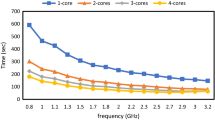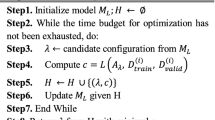Abstract
Power management in large-scale computational environments can significantly benefit from predictive models. Such models provide information about the power consumption behavior of workloads prior to running them. Power consumption depends on the characteristics of both the machine and the workload. However, combinational features such as the cache miss rate cannot be considered due to their unavailability before running the workload. Therefore, pre-execution power modeling requires both machine-independent workload characteristics and workload-independent machine characteristics. In this paper the predictive modeling problem is tackled by the proposal of a two-stage modeling framework. In the first stage, a machine learning approach is taken to predict single-threaded workload power consumption at a specific frequency. The second stage analytically scales this output to any intended thread/frequency configuration. Experimental results show that the proposed approach can yield highly accurate predictions about workload power consumption with an average error of 3.7 % on six different test platforms.






Similar content being viewed by others
References
Kołodziej, J., Khan, S.U., Wang, L., Byrski, A., Min-Allah, N., Madani, S.A.: Hierarchical genetic-based grid scheduling with energy optimization. Clust. Comput. 16(3), 591–609 (2013)
Nesmachnow, S., Dorronsoro, B., Pecero, J.E., Bouvry, P.: Energy-aware scheduling on multicore heterogeneous grid computing systems. Springer J. Grid Comput. 11(4), 653–680 (2013)
Valentini, G.L., Lassonde, W., Khan, S.U., Min-Allah, N., Madani, S.A., Li, J., Zhang, L., Wang, L., Ghani, N., Kolodziej, J., et al.: An overview of energy efficiency techniques in cluster computing systems. Clust. Comput. 16(1), 3–15 (2013)
Wang, L., Khan, S.U., Chen, D., Kołodziej, J., Ranjan, R., Xu, C.Z., Zomaya, A.: Energy-aware parallel task scheduling in a cluster. Futur. Gener. Comput. Syst. 29(7), 1661–1670 (2013)
Laszewski, G.V., Wang, L., Younge, A.J., He, X.: Power-aware scheduling of virtual machines in DVFS-enabled clusters. In: Proc. of CLUSTER’09, pp. 1–10. IEEE, New Orleans, LA (2009).
Jiang, C., Wan, J., You, X., Zhao, Y.: Power aware job scheduling in multi-processor system with service level agreements constraints. J. Comput. 5(8), 1193–1203 (2010)
Bertran, R., Gonzàlez, M., Martorell, X., Navarro, N., Ayguadé, E.: Decomposable and responsive power models for multicore processors using performance counters. In: Proceedings of the ICS’10, pp. 147–158. ACM, New York, NY, Tsukuba, Ibaraki (2010).
Bertran, R., Gonzàlez, M., Martorell, X., Navarro, N., Ayguadé, E.: A systematic methodology to generate decomposable and responsive power models for CMPs. IEEE Trans. Comput. 62(7), 1289–1302 (2013)
Hager, G., Treibig, J., Habich, J., Wellein, G.: Exploring performance and power properties of modern multi-core chips via simple machine models. Concurr. Comput.: Pract. Exp. (2014).
Fan, X., Weber, W.D., Barroso, L.A.: Power provisioning for a warehouse-sized computer. ACM SIGARCH Comput. Arch. News 35(2), 13–23 (2007)
Rivoire, S., Ranganathan, P., Kozyrakis, C.: A comparison of high-level full-system power models. In: Proceedings of the HotPower’08. USENIX, San Diego, CA (2008).
Bellosa, F., Kellner, S., Waitz, M., Weissel, A.: Event-driven energy accounting for dynamic thermal management. In: Proceedings of the COLP’03. New Orleans, Louisiana (2003).
Bircher, W.L., John, L.K.: Complete system power estimation using processor performance events. IEEE Trans. Comput. 61(4), 563–577 (2012)
Goel, B.: Per-core power estimation and power aware scheduling strategies for CMPs. Master’s thesis, Chalmers University of Technology, Gothenburg, Sweden (2011).
Singh, K., Bhadauria, M., McKee, S.A.: Prediction-based power estimation and scheduling for CMPs. In: Proceedings of the ICS’09, pp. 501–502. ACM, New York, NY (2009).
Li, T., John, L.K.: Run-time modeling and estimation of operating system power consumption. In: Proceedings of the SIGMETRICS’03, vol. 31, pp. 160–171. ACM, New York, NY (2003).
Pathak, A., Hu, Y.C., Zhang, M., Bahl, P., Wang, Y.M.: Fine-grained power modeling for smartphones using system call tracing. In: Proceedings of the EuroSys’11, pp. 153–168. ACM, New York, NY (2011).
Chen, X., Xu, C., Dick, R.P., Mao, Z.M.: Performance and power modeling in a multi-programmed multi-core environment. In: Proceedings of the DAC’10, pp. 813–818. ACM, New York, NY, Anaheim, CA (2010).
Hu, C., Jiménez, D.A., Kremer, U.: Combining edge vector and event counter for time-dependent power behavior characterization. Springer Trans. High-Perform. Embed. Arch. Compil. 5470, 85–104 (2009).
Wang, S., Chen, H., Shi, W, (2011) SPAN: a software power analyzer for multicore computer systems. Elsevier Sustain. Comput.: Inform. Syst. 1(1), 23–34.
Singh, K., Bhadauria, M., McKee, S.A.: Real time power estimation and thread scheduling via performance counters. ACM SIGARCH Comput. Arch. News 37(2), 46–55 (2009)
Zamani, R., Afsahi, A.: Adaptive estimation and prediction of power and performance in high performance computing. Springer Comput. Sci. Res. Dev. 25(3), 177–186 (2010)
Bertran, R., Gonzàlez, M., Martorell, X., Navarro, N., Ayguadé, E.: Counter-based power modeling methods: top-down vs. bottom-up. Comput. J. 56(2), 198–213 (2013)
Joshi, A.M., Eeckhout, L., John, L.K., Isen, C.: Automated microprocessor stressmark generation. In: Proceedings of the High HPCA’08, pp. 229–239. IEEE, Salt Lake City, UT (2008).
Hoste, K., Phansalkar, A., Eeckhout, L., Georges, A., John, L.K., Bosschere, K.D.: Performance prediction based on inherent program similarity. In: Proceedings of the PACT’06, pp. 114–122. ACM, Seattle, Washington (2006).
Joshi, A., Phansalkar, A., Eeckhout, L., John, L.K.: Measuring benchmark similarity using inherent program characteristics. IEEE Trans. Comput. 55(6), 769–782 (2006)
Lau, J., Sampson, J., Perelman, E., Hamerly, G., Calder, B.: The strong correlation between code signatures and performance. In: Proceedings of the ISPASS05, pp. 236–247. IEEE, Austin, TX (2005).
Hoste, K., Eeckhout, L.: Microarchitecture-independent workload characterization. IEEE Micro 27(3), 63–72 (2007)
Franklin, M., Sohi, G.S.: Register traffic analysis for streamlining inter-operation communication in fine-grain parallel processors. ACM SIGMICRO Newslett. 23(1–2), 236–245 (1992)
Lafage, T., Seznec, A.: Choosing representative slices of program execution for microarchitecture simulations: a preliminary application to the data stream. Springer Workload Charact. Emerg. Comput. Appl. pp. 145–163 (2001).
Haungs, M., Sallee, P., Farrens, M.: Branch transition rate: a new metric for improved branch classification analysis. In: Proceedings of the HPCA’00, pp. 241–250. IEEE, Toulouse (2000).
Moore, R.: Predicting application performance for chip multiprocessors. Ph.D. thesis, University of Pittsburgh (2014).
Liu, D., Svensson, C.: Power consumption estimation in CMOS VLSI chips. IEEE J. Solid-State Circuits 29(6), 663–670 (1994)
Sakurai, T., Newton, A.R.: Alpha-power law MOSFET model and its applications to CMOS inverter delay and other formulas. IEEE J. Solid-State Circuits 25(2), 584–594 (1990)
Mitchell, T.: Machine Learning. McGraw Hill, New York (1997).
Shanno, D.F.: Conditioning of quasi-newton methods for function minimization. Math. Comput. 24(111), 647–656 (1970)
Hsu, C.H., Kremer, U.: The design, implementation, and evaluation of a compiler algorithm for CPU energy reduction. ACM SIGPLAN Not. 38(5), 38–48 (2003)
Amdahl, G.M.: Validity of the single processor approach to achieving large scale computing capabilities. In: Proceedings of the AFIPS’67, pp. 483–485 (1967).
Cho, S., Melhem, R.G.: Corollaries to Amdahl’s law for energy. Comput. Arch. Lett. 7(1), 25–28 (2008)
Woo, D.H., Lee, H.H.S.: Extending Amdahl’s law for energy-efficient computing in the many-core era. IEEE Comput. 41(12), 24–31 (2008)
Bienia, C., Kumar, S., Singh, J.P., Li, K.: The PARSEC benchmark suite: characterization and architectural implications. In: Proceedings of the PACT’08, pp. 72–81. Toronto, Canada (2008).
Bailey, D.H., Barszcz, E., Barton, J.T., Browning, D.S., Carter, R.L., Dagum, L., Fatoohi, R.A., Frederickson, P.O., Lasinski, T.A., Schreiber, R.S.: The NAS parallel benchmarks. Int. J. High Perform. Comput. Appl. 5(3), 63–73 (1991)
Luk, C.K., Cohn, R., Muth, R., Patil, H., Klauser, A., Lowney, G., Wallace, S., Reddi, V.J., Hazelwood, K.: Pin: building customized program analysis tools with dynamic instrumentation. ACM SIGPLAN Not. 40(6), 190–200 (2005)
Armstrong, J.S., Collopy, F.: Error measures for generalizing about forecasting methods: empirical comparisons. Int. J. Forecasting 8(1), 69–80 (1992)
Alonso, P., Dolz, M.F., Mayo, R., Quintana-Ortí, E.S.: Modeling power and energy of the task-parallel cholesky factorization on multicore processors. Springer Comput. Sci. Res. Dev. 29(2), 105–112 (2014)
Author information
Authors and Affiliations
Corresponding author
Rights and permissions
About this article
Cite this article
Fadishei, H., Deldari, H. & Naghibzadeh, M. Pre-execution power consumption prediction of computational multithreaded workloads. Cluster Comput 17, 1323–1333 (2014). https://doi.org/10.1007/s10586-014-0401-0
Received:
Revised:
Accepted:
Published:
Issue Date:
DOI: https://doi.org/10.1007/s10586-014-0401-0




